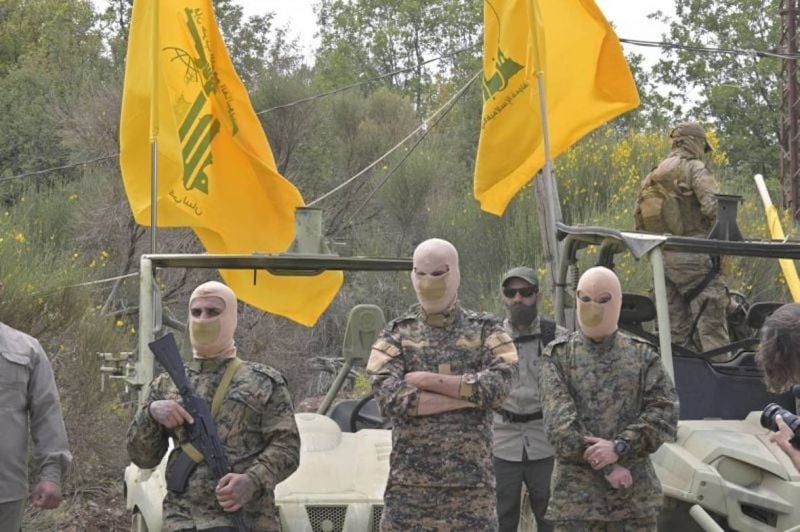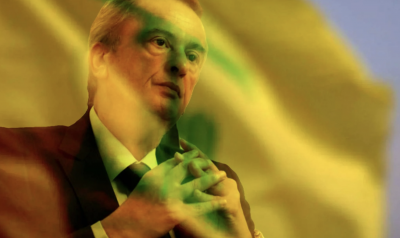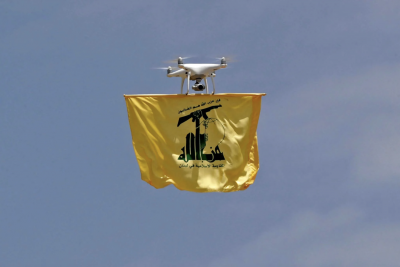
Hezbollah members captured during a military demonstration in southern Lebanon, May 21 2023. (Credit: Nabil Ismaïl)
Lebanon is engulfed in an interminable economic, monetary and financial crisis, and Hezbollah is taking advantage of it. This is the conclusion of a study published this month by The Washington Institute For Near East Policy, a think tank close to American conservatives.
In Cash Cabal: How Hezbollah Profits from Lebanon’s Financial Crisis, banker Samara Azzi and the institute’s senior researcher Hanin Ghaddar attempt to identify the instruments and channels that Hezbollah has used since 2019 to extend its grip on the “cash economy” that took off with the collapse of the banking sector.
How did Hezbollah manage to weave this new spider’s web? What are its main instruments? What is the role of authorities and the financial sector? L’Orient-Le Jour spoke to Hanin Ghaddar about the main findings of this study.
Since its inception, Hezbollah has been regarded as a political and military organization that has always obtained a large part of its funding through the underground economy. What has the crisis changed in this respect?
Corruption has always been one of Hezbollah’s main policies, in particular to ensure the loyalty of its supporters and allies in other political parties, and this has not changed since the crisis. What has changed are the ways in which it finances itself. Before the 2019 crisis, its “economic model” was mainly based on three pillars: Iranian political financing, control of the underground economy (drug trafficking, smuggling, money laundering, etc.) and the financial spin-offs linked to its ability to infiltrate state institutions — both in terms of decision-making and the allocation of resources and public funding. (Just look at how some funding, for agricultural projects for example, has been largely directed towards the areas it controls.)
The situation has changed since 2019. The government has defaulted on its [foreign] debt and no longer has any money to tap into. The central bank (BDL) can no longer continue to draw on its reserves to finance the subsidies that have fueled trafficking (and it only operates thanks to depositors’ money). Finally, Lebanon is no longer relying on bank services. While it has been able to keep some of its traditional sources of income (trafficking, Iranian funds), Hezbollah has had to adapt to this reality by finding other funding channels within this new “cash economy” that has developed. And it is in an even better position to do so because, from the outset, it has always operated in this way: its own model is based on cash.
These financing channels include the remittances sent by the diaspora: since expatriates can no longer send these funds through the banks, they resort to transfer companies — which in Lebanon are mainly controlled by people close to Hezbollah’s Christian allies — and are licensed by BDL to exchange dollars for lira, in exchange for a commission paid by BDL (which is highly unusual). Similarly, money changers, most of whom are part of the Amal and Hezbollah network, have become major players in this “cash” economy, largely replacing the banks, and enabling Hezbollah to capture some of the billions of dollars spent by tourists and expatriates.
Another central instrument in this scheme is al-Qard al-Hassan, a charitable organization licensed by the Interior Ministry that operates, de facto, as a bank — unlike the banking sector as a whole. The money generated by Hezbollah in this “cash economy” is placed in this bank, which then reinvests it in specific projects, such as real estate or solar panels, for example (provided, of course, that these are Chinese and not American) As it is not officially a bank, it escapes the rules of compliance and control (in terms of knowing your customers, anti-money laundering standards, etc.) that are imposed on these establishments.
In your study, you point the finger of responsibility at BDL and its governor, Riad Salameh, in this mechanism. How far does it go?
BDL played a major role in this vicious circle, because ultimately it was BDL that made the agreements with money transfer companies and currency exchangers — via new circulars or by granting licenses to these institutions — in order to be able to recover and withdraw some of the dollars on the market. As a result, these players, and therefore indirectly Hezbollah, would not have been able to make so much money if this policy had not been put in place.
Riad Salameh’s responsibility is all the more obvious as he could very well have chosen to grant these licenses to other institutions with no affiliation or proximity to Hezbollah. Moreover, as Riad Salameh’s term of office comes to an end at the end of July, one of Hezbollah’s priorities is to ensure that it always has an ally at BDL’s helm.
Since the start of the crisis, the banking sector has stood with BDL, including against government reform plans that could have sped up bank restructuring and thus impede the progress of the “cash economy” that is marginalizing it. Are its interests partly linked to those of Hezbollah?
Indirectly, yes. Of course, the shareholders of the banks, most of whom are Christians, did not adopt this line to help Hezbollah. But, like it, they feel threatened by the reforms. In particular, bank restructuring involves sharing out losses, in which they must play a leading role. This is something the bank owners, many of whom are politically connected, do not want.
In the end, they are greedy, even if it hurts the business of their own banks, and it is this greed that has allowed Hezbollah to profit so much from the “cash economy.”
In today’s Lebanon, none of the major players in the system — the corrupt political class, BDL, the banking sector etc. — has any interest in seeing systemic reforms implemented, Hezbollah even less than the others.
This story first ran in French in L’Orient-Le Jour, translated by Joelle Khoury.

